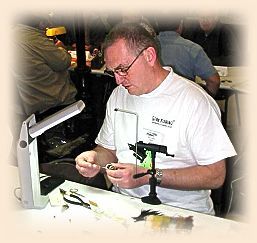|
I have been doing some experimenting
over the last few days as I go out to
the lake over my lunch hour. I had not
been catching as many fish as I normally
do, but I had seen them following the flies.
I had also had some strikes that I could
not hook fish on. This normally indicates
to me that I need to either slow down or go
to a smaller fly.
What really got me started was watching
a few fish hit the rubber hackle legs on
the fly but not the body of the fly. It
was time to experiment with different flies.
I tied flies on in tandem that had either
rubber hackle legs or had a feather hackle
wrapped on them. The feather could be palmered
over the body or at the front like a soft hackle.
I alternated which fly was at the front and
which was at the back so there was not a
preference on that.
What I found by fishing them very slowly
was that I got the fish to hit, but mostly
on the feather hackled flies. I was fishing
the flat that is about 5 to 6 feet deep out
for 30 feet before it drops off into deeper
water. I would cast out and let the flies
drop for about 10 seconds before doing
anything else. Then I would bring them in
at the rate the waves were pushing the line
in. The wind was blowing about 10 mph for
reference.
What would happen is that I would see the
line twitch and that was it. But every
time I set the hook I had a nice gill on
the line. All of them on the feather-hackled
fly. This was not fast fishing but a fish
every 5 minutes at noon time in the middle
of July is just not bad.
I did try fishing the flies faster, deeper,
and shallower to see if that would make any
difference on which fly they hit. The only
difference was that the rubber hackled flies
were not catching anything. I don't always
learn fast but I do learn some of the time.
Today I decided to see if there would be any
difference between a fly with palmer hackle
and one with the hackle wrapped at the front.
I tied these in tandem again and alternated
which was the dropper again.
What I found today was that it did not seem
to matter much which way the fly was tied.
I caught fish on both types of flies and even
had doubles a couple of times. The conditions
were the same as yesterday, wind temperature,
and cloud cover.
This is my guess as to what is happening with
the flies. The rubber hackled flies just have
to move too fast to get the action of the rubber
to work. The fish follow them, but it is just
too much activity. The feather hackled flies
can be moved much slower and the hackle still
moves. The movement given to the fly by the wave
action moving the end of the fly line seems to
be just enough to make the fly enticing.
I did watch the flies as they were close to
shore and could see this action going on.
This means that I will need to get some more
flies tied up to do this when I go out on other
ponds to see how it works. Give it a try and
let me know if it works in the ponds and lakes
that you fish.
Hope you can get out on the water. ~ Rick
|




